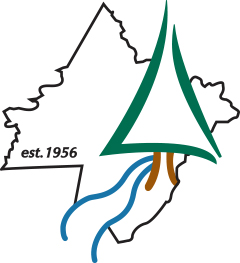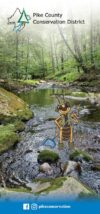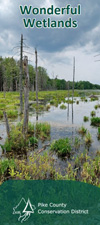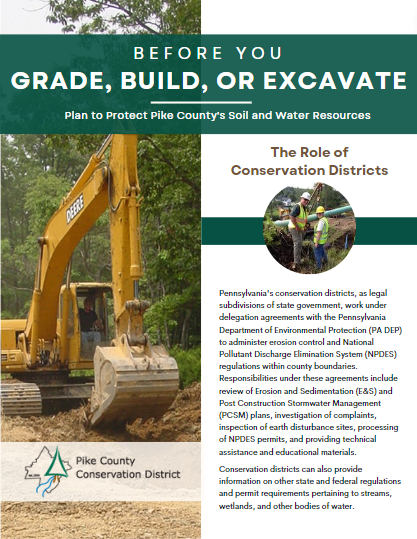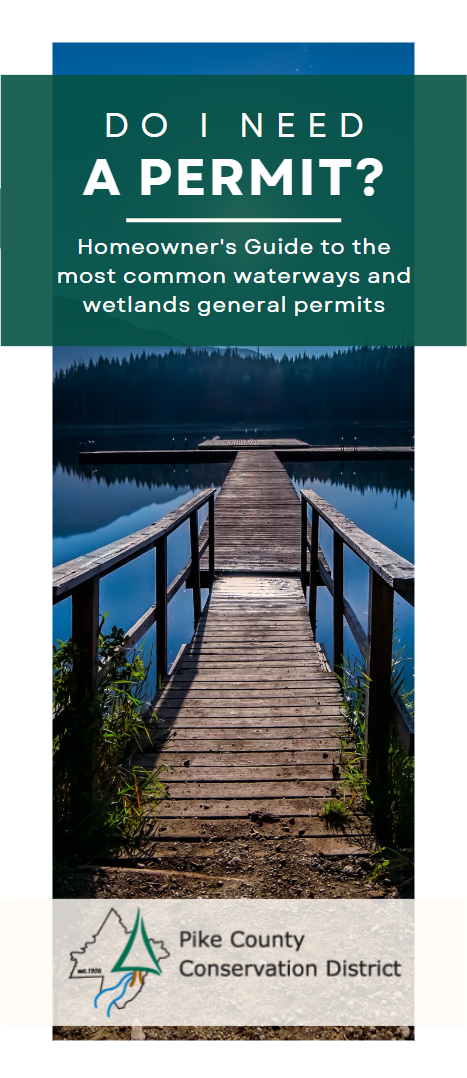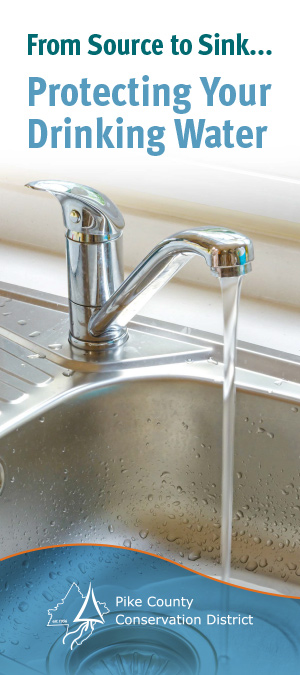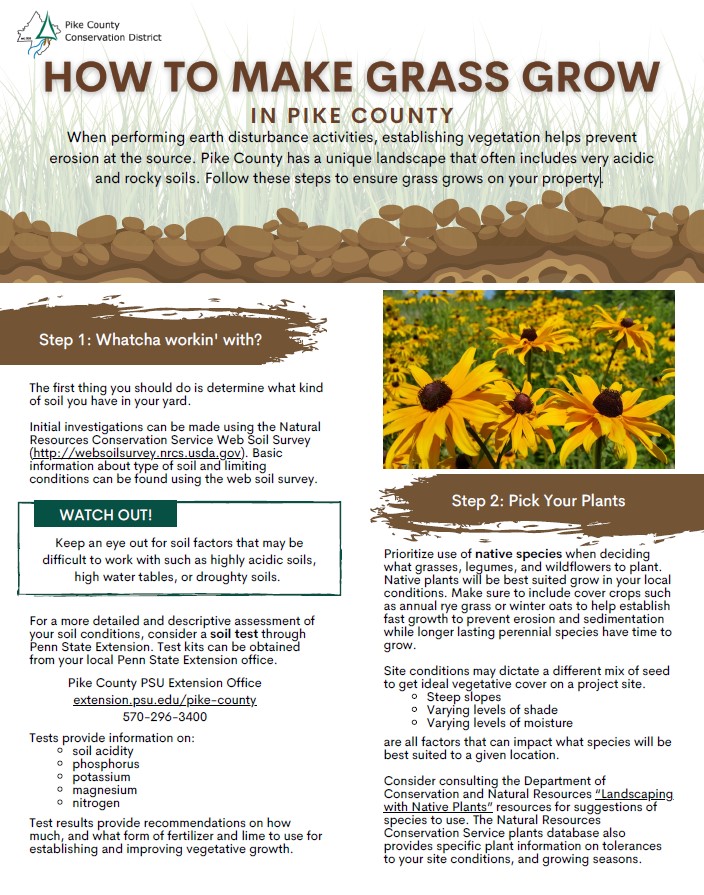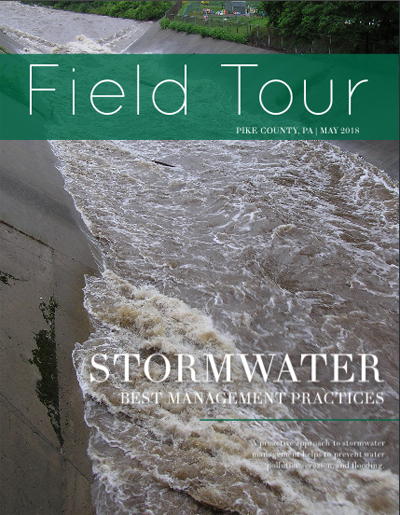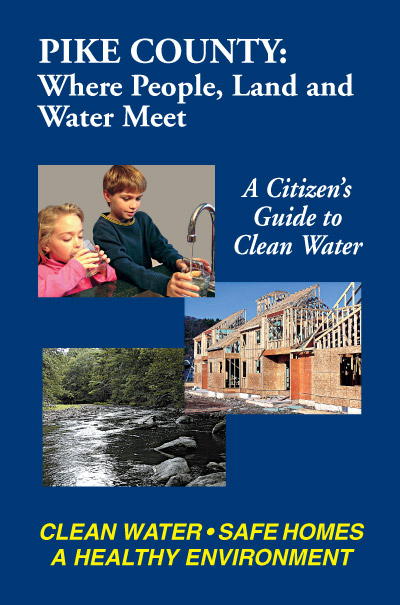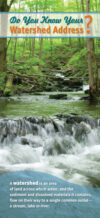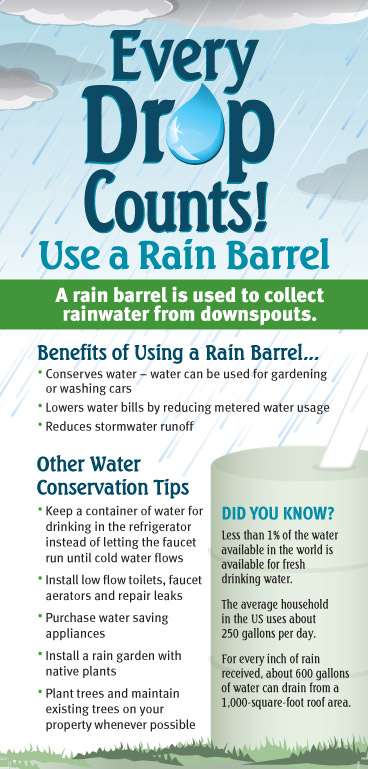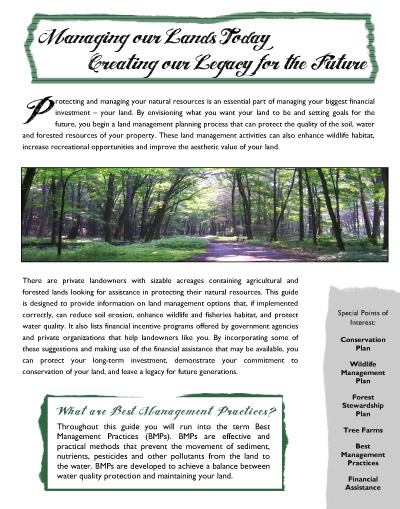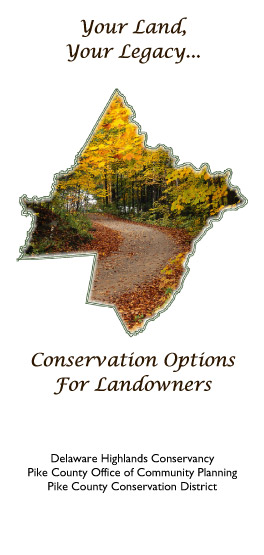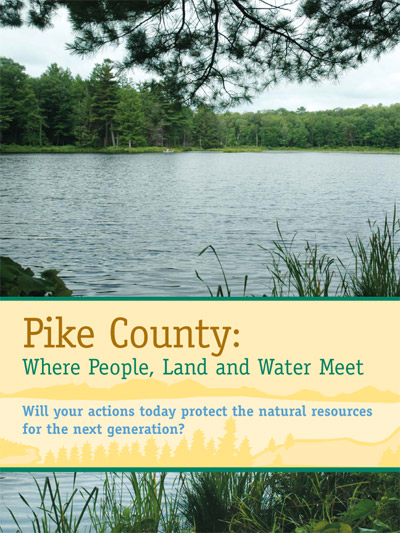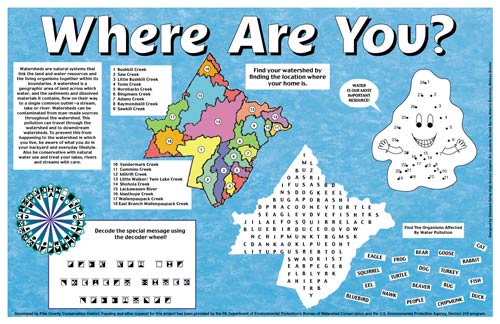
Educational Resources: Video & Print
Video Resources
The Pike County Conservation District has produced videos and video series so that you can watch some of our programs from home.
BMP Field Tour Series
In the summer of 2018 PCCD hosted a field tour of local stormwater management projects in Pike County.
These projects showed what the Best Management Practices (BMPs) for stormwater look like and how they contribute to better management.
Introduction to Leaf Pack Network Webinar
Introductory webinar from Tara Muenz, Assistant Director of Education and Leaf Pack Network Administrator at Stroud Water Research Center. In the summer of 2021, Pike County Conservation District will be conducting a Leaf Pack Network Exploration.
To find out what that means, and how to participate, watch this introductory webinar!
Japanese Knotweed 101
This instructional webinar is to educate homeowners and landowners on how to rid their property of the invasive species, Japanese Knotweed.
Vincent Cotrone from Penn State Extension gives instruction including manual removal and chemical control as well as a schedule for when to carry out this control on your property!
Pike Wayne Conservation Partnership River Sojourn
This is the first installment in our Conservation Hour video series.
Take a trip with us down the Delaware River, learn about how to collect macroinvertebrates, and learn more about nature on the river.
Ways to Help Your Lake Stay Healthy Webinar Series
In the summer of 2019, to help residents protect local water resources, PCCD hosted a virtual series titled “How your Backyard Activities Affect Your Lake.”
Each program has information essential for home and property owners in Pike County.
What is Killing My Tree?
Garrett Beers, Service Forester with the Department of Conservation and Natural Resources, tells us What's Wrong with Your Tree.
Learn about the insects, illnesses, and other issues that could befall the trees on your property!
To view all videos from the Pike County Conservation District, visit our YouTube Channel.
Subscribe to our eNewsletter to be the first to see new videos and other fun, educational content from the Pike County Conservation District!
Print Resources
The Pike County Conservation District has several publications available to help maintain a healthy home and environment.
What We Do For You
An Overview of District Programs
Learn about the District's mission, state delegated programs, watershed conservation, education programs, and more.
Wonderful Wetlands
Everyone Can Take Simple Actions to Help Keep Our Wetlands Healthy.
Learn what makes a wetland, how to identify one, the benefits that they provide to our community, and how you can help conserve these important ecosystems.
Before you Grade, Build, or Excavate Guide
Plan to Protect Pike County's Soil and Water Resources
Are you planning a building project? Learn how to control erosion on your project and prevent sediment pollution.
Do I Need a Permit?
Homeowner's Guide to the Most Common Waterways and Wetlands General Permits
Learn the difference between the variety of General Permits and when each is required.
Where Does Your Water Come From?
From Source to Sink...
Learn about source water in Pike County and find some tips on how you can help protect your drinking water sources at home.
How to Make Grass Grow
Follow These Steps to Ensure Grass Grows on Your Property.
When performing earth disturbance activities, establishing vegetation helps prevent erosion at the source.
Stormwater Best Management Practices Field Tour Guide
Proactive Project Planning
Properly managing stormwater can help to prevent water pollution, flooding and erosion.
The Pike County Conservation District produced this guide to BMPs with support from a PA DEP Environmental Education Grant.
Citizen’s Guide to Clean Water
Clean Water, Safe Homes, A Healthy Environment
Learn about on-lot septic system maintenance, ground water, pond and lake ecology, and more.
Do You Know Your Watershed Address?
Locate Your Address
Identify your watershed along with some interesting facts about the water resources in that watershed.
Every Drop Counts
Use a Rain Barrel
Learn how by conserving water YOU contribute to the communities’ natural resources!
Use a Rain Barrel brochure is a result of a 2014 Pike/Wayne Conservation Partnership DEP Environmental Education Grant. The project received a 2014 Northeast Pennsylvania Environmental Partnership Award for their work in environmental protection!
Managing our Lands Today — Creating our Legacy for the Future
Learn Best Management Practices
Learn about sources of financial assistance that may be available for landowners to implement BMPs.
The District, in cooperation with the Pike County Office of Community Planning, NRCS, DCNR, the Agricultural Land Preservation Board, the Scenic Rural Character Preservation Board along with the Pike/Wayne Conservation Partnership have developed a brochure outlining Best Management Practices (BMPs) that can be utilized in Pike County.
Your Land, Your Legacy
Conservation Options for Landowners
Learn about options for preserving your land into the future.
The District, in cooperation with the Delaware Highlands Conservancy and the Pike County Office of Community Planning, has developed a brochure on conservation options available to landowners in Pike County.
The brochure printing was funded with an Environmental Education mini-grant from the PA Department of Environmental Protection.
Pike County: Where People, Land, and Water Meet
Will Your Actions Today Protect the Natural Resources for the Next Generation?
Learn about forestland preservation, stormwater, water conservation, septic system maintenance, protecting water resources, and community involvement.
This newspaper insert was funded through a League of Women Voters Water Resources Education Network grant. Project partners include the Delaware Highlands Conservancy and the Delaware Township Supervisors.
Where Are You?
Kids Activities
Locate your watershed address through a series of fun puzzles on a 11″x 8.5″ Placemat.

Invasive species cost the US over 120 billion dollars each year. These species impact tourism, transportation, resource use, water withdrawals and much more.
Never move animals or plants from one area to another. Don’t move firewood, soil, or other items that might contain insects or microbes.
